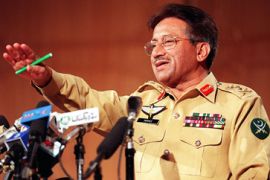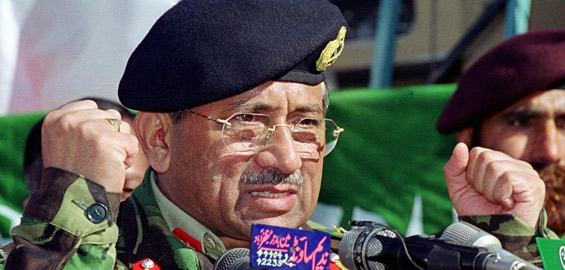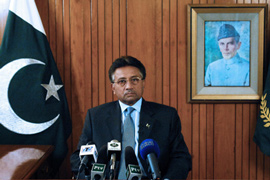The rise and fall of Musharraf
Pervez Musharraf has resigned as Pakistan’s president. We chronicle his rise and fall.


Musharraf announced his resignation in a live televised speech on Monday [AFP]
The second of three brothers, Pervez Musharraf was born into a middle class Muslim family in India in August 1943. His family moved to the newly created majority-Muslim state of Pakistan following India’s independence and partition in 1947.
He spent seven years in Turkey, during his civil servant father’s posting to Ankara. In 1956 the family settled in Karachi.
Entering the Pakistan Military Academy in 1961, the keen sportsman first saw action in the 1965 war against India and was decorated for gallantry. He had to endure the army’s humiliating defeat by India in the 1971 war and served for seven years in Pakistan’s special service commando group.
Promoted to the rank of general and named army chief in October 1998, Musharraf overthrew then prime minister Nawaz Sharif in 1999 in a bloodless coup. He first led the country as chief executive and then won a five-year presidential term in a 2002 referendum which critics say was rigged.
Chronology of major developments since Musharraf seized power:
| 1999 |
October 12: Musharraf overthrows elected prime minister Nawaz Sharif after Sharif sacks him as army chief.
| 2000 |
May 13: Supreme Court validates coup.
December: Sharif is freed from prison on hijacking and corruption charges, exiled to Saudi Arabia and banned from returning to Pakistan for 10 years.
| 2001 |
June 20: Musharraf declares himself president after the incumbent, Mohammad Rafiq Tarar, resigns.
September 11: Musharraf drops support for Taliban and allies Pakistan with Washington after 9/11 attacks.
| 2002 |
April 30: Musharraf wins controversial national referendum on his rule.
October 10: Pro-Musharraf Pakistan Muslim League-Q wins general elections.
November 16: Musharraf sworn in for a fresh five-year term.
| 2003 |
December: Musharraf escapes two assassination attempts, one by Islamist military officers and the other by Al-Qaeda.2
| 2004 |
January 1: Musharraf wins parliamentary vote of confidence affirming his unelected rule until 2007.
February: Musharraf pardons nuclear scientist Abdul Qadeer Khan for leaking nuclear secrets to Iran, North Korea and Libya.
December 30: Musharraf reneges on promise to quit as army chief.
| 2007 |
March 9 – Musharraf suspends Supreme Court justice Iftikhar Chaudhry over allegations of misconduct. Lawyers rally around the top judge and Musharraf’s popularity plummets.
July 10 – Musharraf orders troops to storm the Red Mosque in Islamabad to crush a Taliban-style movement there. At least 105 people are killed. Militant attacks and suicide bombings follow.
July 20 – Supreme Court reinstates chief justice Chaudhry, dealing a blow to Musharraf’s authority.
July 27 – Musharraf meets former prime minister Benazir Bhutto in Abu Dhabi for inconclusive talks on how to move the country towards a civilian-led democracy. Bhutto demands Musharraf step down as army chief.
Sept 10 – Former prime minister Nawaz Sharif is arrested at Islamabad airport on his arrival from exile, despite the Supreme Court clearing his return. He is deported to Saudi Arabia.
Oct 2 – Musharraf’s government announces it will drop graft charges against Bhutto, clearing the way for her return.
Oct 6 – Musharraf wins a presidential vote by legislators. Supreme Court holds off confirming legality of vote.
Oct 19 – Suicide bomber tries to assassinate Bhutto in Karachi as she returns from eight years of exile.
 |
| Musharraf said everything he did, he did for Pakistan in his resignation speech [AFP] |
Nov 2 – Supreme Court meets to decide if Musharraf was eligible to stand for re-election while still army chief.
Nov 3 – Musharraf imposes emergency rule, detaining thousands of opposition politicians and lawyers.
Nov 11 – Musharraf says election will be held by January 8.
Nov 13 – Bhutto placed under house arrest for a week in Lahore, hours before planned march against emergency rule. Bhutto says Musharraf must quit as president.
Nov 15 – Musharraf appoints Senate chairman Mohammadmian Soomro to head a caretaker line-up to oversee elections.
Nov 22 – Commonwealth suspends Pakistan.
Nov 25 – Sharif returns from exile.
Nov 28 – A tearful Musharraf hands over command of the army to General Ashfaq Kayani.
Nov 29 – Musharraf sworn in as a civilian leader.
Dec 15 – Musharraf lifts state of emergency, restores constitution.
Dec 27 – Pakistani opposition leader Benazir Bhutto assassinated in a gun and bomb attack.
| 2008 |
Jan 2 – Election delayed from Jan 8 to Feb 18 because of disturbances after Bhutto’s assassination.
Feb 18 – Resounding election victory for parties led by Bhutto’s widower Asif Ali Zardari (Pakistan People’s Party) and Sharif (Pakistan Muslim League (Nawaz)) over pro-Musharraf Pakistan Muslim League. Analysts say Musharraf may be driven out.
March 9 – Sharif says he will join Zardari to form a coalition hostile to Musharraf.
March 24 – Parliament elects Bhutto aide Yousuf Raza Gilani as prime minister.
August 7 – Coalition says Musharraf to face impeachment.
August 17 – Coalition says it has finalised impeachment charges.
August 18 – An emotional Musharraf announces his resignation in a televised address to his nation.